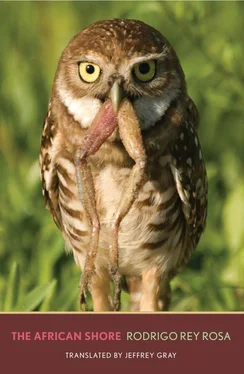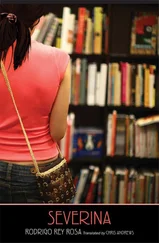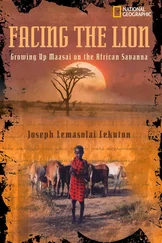They sipped their tea and talked about trivialities: the situation of Morocco, the possibilities for change, the fate of Pinochet, and the similarities and differences between Pinochet and the Sultan.
“Obviously, everyone ought to be able to express himself about anything, but not on the radio or in the press. There are limits,” Julie was saying.
Mme. Choiseul was more interested in learning how the owl had been injured than in discussing the limits of freedom in a Muslim nation.
He told the story of the thief in the Medina.
“Who would want to steal an owl?” Julie asked. “Are they valuable?”
“I know that they sometimes hunt them,” said Mme. Choiseul. “They’re easy to trap. I don’t think they’re worth a lot, but of course that is relative. Any little boy can catch one.”
“And what do they use them for?” Julie wanted to know.
“God knows,” said Mme. Choiseul, “but clearly they can sell them.”
He told them then how the consul’s friend had offered him a thousand dirhams for the bird.
“Maybe it was a joke,” he said at last.
“But do you suspect him?”
“It seems absurd.”
“The Honorary Consul of Colombia,” said Mme. Choiseul, “does not have the best reputation. If I were you, I wouldn’t try to recover my passport through him. Unless you plan on staying here quite a long time.”
“But then what should he do?” asked Julie.
“He can have it sent directly from his country, through Rabat.”
“Thank you for the advice,” he said. “I’ll see what I can do.”
Artifo came in with a tray to pick up the cups and asked if they wanted anything more. It was already dark out, and the red fire blazed in the window panes.
Julie was driving Mme. Choiseul’s car down the narrow Monte Viejo road between the curving walls of the European mansions.
“Do you have a girlfriend?” she asked.
“No.”
“Are you married?”
“No.”
They arrived in silence at the “Jews’ River,” which runs by the foot of Monte Viejo.
“I have a friend in Colombia. We live together, but it’s not going too well. How about you?”
“No, I live alone.”
Now they were driving straight up Dradeb Street, a mill of activity where Muslims dashed nimbly from one curb to the other, dodging cars. The lights of the grocery shops, the foundries, and the bakeries — crowded into the ground floors of the apartment houses — shone the length of the steep street. Julie was saying it was typical of a Southern country that rich people’s houses were surrounded by slums. She asked if it was that way in Cali too.
“Exactly. Can I take you to dinner?”
“I don’t see why not,” said Julie, smiling. “But I had the impression you had no money.”
“That’s true. But with a little luck I can get some cash from one of the ATMs on the Boulevard. None of them were working this morning.”
“Oh, is that all it is? I thought it was more complicated. I have to confess you had me intrigued.”
“Well, then, shall we go out to dinner?”
“If you like. But I have to warn you I hate Moroccan restaurants, and I don’t eat fish.”
“Vietnamese?”
“Why not?” But she seemed doubtful.
“I’ll have to go to the pension first to drop off the owl.”
Julie parked in Portugal Street, near the lower entrance to the Medina.
“Run,” she said. “I’ll wait here.”
He didn’t like to lie but sometimes the truth about himself seemed so unacceptable that he let himself, always thinking he’d change things later so the fiction would match the reality. He could have been single, though in the eyes of the law he was married — since he had lived several years with his girlfriend — just as he could have been something other than an ordinary tourist with a mislaid passport. He looked in the mirror. As women were always saying, men were dogs. Smiling uncomfortably, he turned and shut the light off.
The ATM again refused to cooperate.
“It doesn’t matter,” said Julie. “I’ll treat.”
During dinner at “The Pagoda,” they talked more about Moroccan politics, while several decorative carp swam up and down in the small aquarium beside them.
They came out of the restaurant onto the dark street carpeted with plastic garbage.
“Where shall we go?” Julie asked.
“You decide,” he said.
“I don’t suppose you’d have a little weed at your pension?”
Attup let them in with professional discretion.
“Excuse the mess,” he said, before opening the door of his room.
The sheets were twisted up and some books lay scattered on the floor around the bed — travel guides and novels. A Moroccan ashtray full of loose tobacco and cigarette butts. Some soiled newspapers and magazines spread out at the foot of the radiator, where the owl sat. The air smelled damp.
“And this?”
A naked bulb, his reading lamp, was stuck to the wall with a piece of insulating tape.
“My own design. You can sit on the bed.”
“Yes, there’s nowhere else.”
Now the two of them were on the bed, face to face, she with her head propped on one hand. He was emptying a cigarette. He reached out his arm to dump the tobacco in the ashtray, and took his nabula of kif from under the mattress. He untied it and began to fill the cigarette.
“And that?” she said, pointing to the pouch—“is that your own design too?”
“No, no. It’s traditional.”
He stood up to dump the ashtray in a wastebasket and came back to sit on the bed. He wet the cigarette with saliva and lit it.
While the kif cigarette burned down, moving back and forth between their mouths, tracing arabesques of blue smoke in the trapped air, he imagined that he was spreading cream on Julie’s thigh, massaging it in with both hands.
“Oh, God,” she was saying.
He was kissing her buttocks, passing his tongue over the dangerous places. He slid up her spine to her neck, biting a thick lock of her hair.
“Oh, I’m soaked.”
The nipples of her smooth white breasts were curiously inverted; they grew inward; on squeezing them between his lips they emerged for a moment then sank back in the milky flesh like the retracting horns of a snail.
“It was healthy when I bought it, I’m sure of it.”
“Forget it — what can you do?” she said, looking at the owl. “But it’s not good here — in this room, with this humidity. It doesn’t look healthy.”
“Yes. It would be better in the mountains.”
“Why don’t you give it to me?”
“If you like.”
“I’m not sure.” She passed him the cigarette, and he put it out in the ashtray. “Maybe you can come with it.”
“You think?”
“I’m sure.” She looked at her watch. “But now I’d better go. Christine might worry. See you tomorrow?”
“I hope so.”
“I’ll come to look for you.”
“I’ll be waiting.”
A quick kiss on the mouth, no saliva.
“Au revoir, beauté,” Julie said to the owl.
“See you tomorrow,” he said.
Once alone in the room, he tore off a sheet of paper from the block he kept in his suitcase and began to write a letter home asking for money. Later in the night he had a typical dream of guilt: Swimming in a river, he saw people walking on the water, though he had to struggle hard just to stay afloat.
Not Julie but Mme. Choiseul came to look for him the next morning. Attup led her up to his room.
“Julie’s gone with Fátima to the public bath for a massage,” Mme. Choiseul explained. “She asked me to pick you up. Would you like to spend a few days with us?”
Читать дальше












